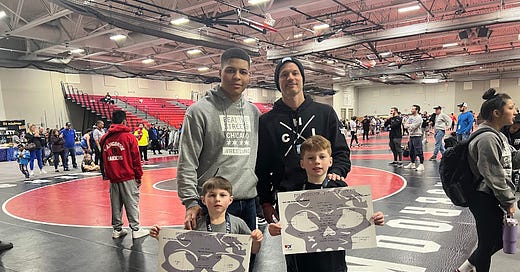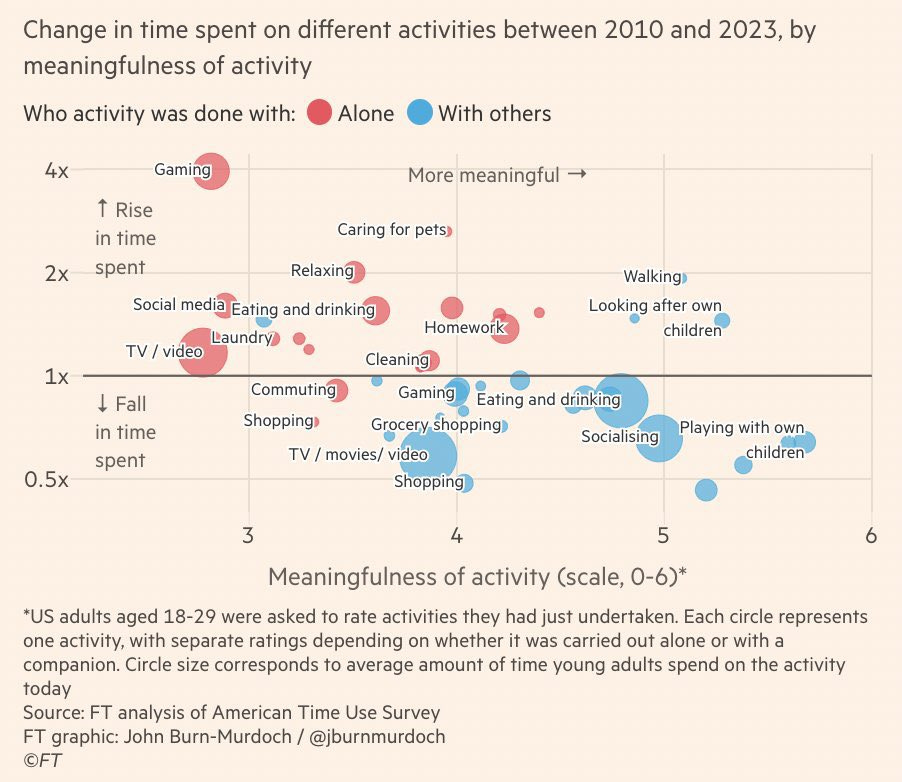🔥Welcome to Volume #00118!🔥
I’m Christian Champ. This is ☯️The Middle Way Newsletter ☯️. It is a place where I write, explore, share, and invite you along for the journey.
If you enjoy the newsletter, please share it with your friends.
🌍47 Bits of Wisdom on My 47th Birthday🌍
Do things that compound: sleep, reading, writing, working out, sports, storytelling, acting, comedy, selling, meditating, breath work, eating habits, etc.
Be a learning maniac. Lifelong learning keeps us open, alert, and adaptable.
Have 2-3 things we are actively learning and spending time on every week.
Everything happens in phases—appreciate each one, knowing it will end.
Early in life, focus on adding skills. As experience grows, shift toward wisdom, which maybe is the ultimate skill.
Start with curiosity. Ask why, then ask why again. The depth of what we think we know disappears quickly.
“Maybe” is the most powerful word we have. Most things we believe to be true fall under maybe—this is a gift, not a curse, keeping life open for further exploration.
Assume positive intent (or at least ignorance over malice).
Gratitude is the gift that keeps giving—give it to ourselves and others.
No one cares, which means we are free to experiment and not worry about “what they think.”
More grace—for ourselves and others—is always a good starting position.
We are always figuring it out and likely never will. That’s what makes life interesting and beautiful.
Pause, reflect, and give thanks. That is how we stay on our path.
Starting today is better than starting tomorrow. If we want to do it, do it now.
When feeling stuck, do something and get moving.
Meet people where they are, especially if we want to get them to move somewhere with us.
Nothing creates unlocks us like having new vantage points (new ideas, inside out, upside down, backward).
Release bad ideas or ones that don’t serve us. If we need to we can always go back to them.
All scripts are made up, go unconventional and see what happens.
Our direction determines our destination, and we can always change it.
Ask what am I optimizing for when taking an action, and if there isn’t an answer move on to something else (caveat exploring for exploring sake is a perfectly acceptable answer).
Limit expectations to only what we can control.
Everything is a trade-off, and it can take a lifetime to know—or never know—if we made the right trade-off.
There is no perfect solution, and the solution that worked yesterday may not work today.
Meet our expectations for ourselves by creating robust systems and processes.
Thinking we know why someone did something is fool’s gold. We often don’t know why we do things, but we should try to figure ourselves out.
When we think we are being “rational,” define rational—there is no single thing we are maximizing that explains all our actions.
Most things don’t matter, but some things do—focus on those.
Surround ourselves with people who inspire us. (Hack: This can be in real life, online, through books, teachers, podcasts, or mentors we’ve never met.)
Find people who bring out the best in us and spend as much time with them and their energy as possible.
Be excited for the success of others—it makes life more enjoyable for everyone.
Envy is poison—avoid it at all costs (unless we want to use it as fuel).
We all play status games, so make ours about something meaningful (not material things).
Do the heavy lifting— the bigger the challenge, the larger the feeling of accomplishment.
Make things better.
Be excited, asking, “I wonder what happens next?”—especially when things seem dark or stuck.
No pyrrhic battles. Fight only for what truly matters.
Focus on what matters and do those parts well.
Let go of things we won’t care about a week, month, year, or decade from now.
Being of service is the ultimate goal. Find ways to light other people’s fires and keep them burning bright.
Meaning comes from doing hard things in service of something bigger than ourselves.
The best times come from doing something challenging with people we care about—work, hikes, deep conversations, long walks, BJJ, capoeira, and other activities. As the years get skinnier, how do we do more of that?
Be wealthy - wealth isn’t about money but understanding what our “wealthy” life is really about and doing it.
Maximize for things that provide huge dividends - health, learning, community, and wealth.
We become what we think about and the stories we tell. We change our lives when we tell better stories and improve our thinking.
How can we answer the question: If this is all there is, is it enough?
Life is tragic, magic, and comic. We don’t have to enjoy the tragic part of it, but we get to embrace the comedy and the magic fully.
We get a short run on this rock ball rotating around the sun, so appreciate all the moments we get.
🧠Things to Think About🧠
Morgan Housel on Minimum Levels of Stress
Morgan offers that the reason people get worked up on trivial things is because things are so good. Instead of major issues to galvanize or focus on, we trifle on small things. It is a good problem to have, even if it doesn’t seem that way.
Part of the reason today’s world is so petty and angry is because life is currently pretty good for a lot of people.
There are no domestic wars.
Unemployment is low.
Household wealth is at an all-time high.
Innovation is astounding.
It’s far from perfect, and even an optimist could list hundreds of problems and injustices. A pessimist could do worse.
But let me put it this way: As the world improves, our threshold for complaining drops.
🎧Things to Listen, See, and Watch 🎧
Josh Waitzkin goes deep with Huberman on Learning and Living
Competition
Early competition forced Josh to confront weaknesses, shaping his mindset and resilience.
Self-Expression
Stay true to your self-expression to avoid internal struggles and ensure long-term fulfillment.
Connections
Seek patterns and connections in life. For Josh, chess led to Tai Chi, BJJ, surfing, and eventually sharing his lifelong learnings.
Failure & Growth
Failure is essential for growth. It exposes weaknesses and prompts change.
Repeated failure, combined with persistence, builds frustration tolerance and fuels breakthrough moments.
Losses often trigger unconscious growth in other areas.
Frame Rates & Time Perception
Slowing down time enhances performance.
Josh’s broken hand in competition led to a heightened awareness that improved his performance.
The In-Between (Transitions)
Mastering transitions—between moves, positions, and states—leads to true mastery.
Marcelo Garcia’s relentless movement kept him in the "in-between," creating constant opportunities.
Pre-Action Awareness (Surfacing the Step Before Action)
Pause and review before acting—this prevents errors before they happen.
Useful for speaking, decision-making, and avoiding reactive mistakes.
Poor decisions often happen in high-arousal, narrow-focused states.
Managing High-Arousal States
High emotional states (anger, fights, arguments) often lead to regrettable actions.
Learn to shift between relaxed and high-arousal states to improve decision-making.
Firewalking: Learning from Others' Mistakes
Cultivate the ability to learn from others’ failures as intensely as your own.
Use biofeedback, visualization, and psychological triggers to accelerate learning.
Reflect deeply on others’ mistakes, treating them as personal lessons.
Daily Reflection
Spend 10–15 minutes daily escaping stimulus-response mode.
Allow subconscious insights to surface, breaking reactive patterns.
Reflection creates space for personal and professional growth.
Less is More
Doing less can enhance productivity and creativity.
Many top performers oscillate between peak performance and burnout—awareness is key.
Mastering stress and recovery cycles is essential for sustained excellence.
Universal vs. Localized Learning
Seek universal principles, not just specific tactics.
Every discipline holds broader life lessons when examined deeply.
Tracking Our Path
Live authentically, follow passions, and embrace uncertainty.
Capture insights first thing in the morning using pen and paper before digital distractions.
Alignment of Energy & Creativity
Align peak creativity with peak energy levels.
Block time for creative work during high-energy periods.
Balance stress and recovery throughout the day.
Quality Over Quantity
Prioritize quality in every aspect of life, from skills to relationships.
Every action reinforces patterns—sloppiness leads to more sloppiness, while quality compounds improvement.
How We Spend Our Time
The chart below shows the time spent on activities and the meaningfulness of the activities. The most meaningful tend to involve others, but time spent is doing things alone. The easiest way to increase meaning is for us to do the things that we see as meaningful! What does your chart look like?
💣Words of Wisdom💣
"For the best results with your children spend only half the money you think you should but double the time with them." (Kevin Kelly, Excellent Advice for Living)
"Low price is the last refuge of a marketer who has run out of generous ideas." (Seth Godin, This Is Marketing)
"The women reported getting greater satisfaction from spiritual pursuits—meditating, praying, going to church—than watching television. But they spent five times longer in front of the screen than engaging in activities that were more satisfying." (Michael Gervais, The First Rule of Mastery)
"Ritual introduces you to the meaning of what’s going on. Saying grace before meals lets you know that you’re about to eat something that once was alive." (Joseph Campbell, A Joseph Campbell Companion)
"The core of coaching does have a powerful central premise: your beliefs about life are not reality. A great coach asks you to question your deeply held beliefs and rules for yourself." (Boyd Varty, The Lion Tracker's Guide to Life)
"Essentialists see trade-offs as an inherent part of life, not as an inherently negative part of life. Instead of asking, "What do I have to give up?" they ask, "What do I want to go big on?" (Greg McKeown, Essentialism)
"For me, discipline is not about simply sticking to a routine and making progress. It’s about finding new ways to constantly work toward my goal of continuous progress." (Chris Wojcik, The Hard Truth About Discipline)
"Priorities are the things you need to get right so the things you love can thrive." (Scott Adams, How to Fail at Almost Everything and Still Win Big)
"Simple heuristic: If you’re evenly split on a difficult decision, take the path more painful in the short term." (Eric Jorgenson, The Almanack of Naval Ravikant)
"Shortly after training camp with the 1992 U.S. Olympic men's basketball Michael Jordan and Scottie Pippen were reflecting on what they had learned. "Just imagine," Pippen said to Jordan, "how good Clyde Drexler would be if he worked.” (Paul Rabil, The Way of the Champion)
"“You can accomplish anything,” she once told me, “as long as you are willing to let others take credit for it.”" (Alberto Villoldo, Shaman, Healer, Sage)
🙏Thanks for Reading🙏
I appreciate everyone for being here on this journey with me. If I can help with anything, reach out.
Namaste,
Christian
Coach Max with the crew after a successful tournament ending with some bracket boards.















Share this post